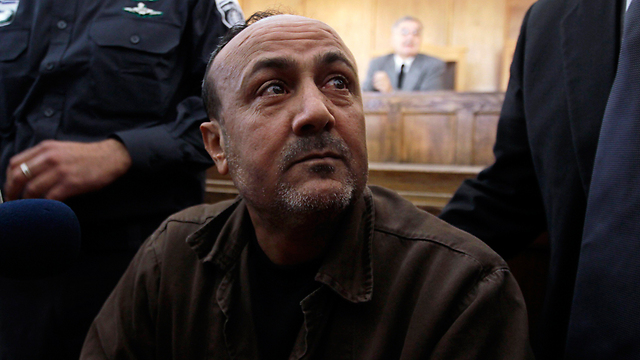
Could Barghouti become Israel’s peace partner?
Op-ed: Through a hunger strike in Israel’s prisons, Marwan Barghouti wishes to fulfill his achievements in the last Fatah elections and position himself as Abbas’ successor. It may be time for Israel to change its tune and try to talk to the man who the Palestinians see as their leader.
Marwan Barghouti scheduled the Palestinian prisoners’ hunger strike precisely and intentionally at a time when the Palestinian society has reached one of its low points: With no political horizon; with a catastrophic economic situation, mainly in Gaza, and with the worst rift possible between Hamas and the Palestinian Authority.
The despair has even led to a break in the ground battles against Israel: The drizzle of terror attacks is sporadic, and mostly reflects the hatred and personal issues of its perpetrators. This is no longer the terrorism “of hope,” with national motives, like in the days of the intifadas.
Make no mistake about it: A hunger strike is the prisoners’ ultimate weapon, and it is political and has political objectives in any event. This was the case in the 20 hunger strikes Palestinian inmates have held in Israel’s prisons since 1969.
The achievements they reached through these strikes should not be downplayed: First and foremost, they received the de facto status of political prisoners, whose status in the jail is different from the status of criminal prisoners. In addition, they received a special moral status and importance among the Palestinian society.
Barghouti’s reasons for the strike are only a setting for the political goal, which is directed this time mainly at the Palestinian leadership and society, and especially at Palestinian President Mahmoud Abbas. Barghouti wishes to fulfil his achievements in the latest Fatah elections and be appointed as Abbas’ deputy, in a bid to reach an influential spot and position himself as the successor despite being in prison.
Through the strike, he is trying to force Hamas and Fatah to search for ways to reach a reconciliation, as he understands that without the Gaza Strip negotiations are out of the question; and he is indicating to Israel that time is running out, and that if the parties fail to return to the negotiating table—the Palestinians will turn to the struggle path.
More than 600,000 Palestinians have passed through Israel’s prisons since 1967. There are hardly any families in the territories that don’t have a son who has been detained. The Israeli prison has become part of the collective experience shaping the ethos of the conflict. This is why the concern for the prisoners, the solidarity with their struggle and the hopes for their release are shared by everyone, regardless of ideologies, factions and rifts. In the Palestinians' eyes, the prisoners are a patriotic model of a sacrifice for the national goal. That is also why the West Bank has been flooded with demonstrations and parades in support of the strike.
Abbas and Hamas are in a catch-22 situation. The hunger strike is seen as a headache both in Ramallah and in Gaza, but they have no choice—because of the street’s support—but to support it. Abbas would rather see Barghouti, who is much more popular than him, in jail. He won’t dare come out against him, however, and definitely not against the hunger strike. On the contrary: The longer it lasts, the firmer the statements he will issue in favor of the strike.
Hamas, which is busy building its new leadership and preoccupied with the deep economic crisis in Gaza and with the electricity crisis, which is causing a public unrest, won’t be able to sit idly by either. Yahya Sanwar, who was jailed for life and released, has yet to order his people in prison to join the strike, but they will likely join it gradually. In any event, Barghouti will have Hamas’ full support.
The Palestinians want a new leader. They have stopped legitimizing Abbas’ rule, and they understand that Hamas is not a long-term solution. They also want a change, which is why they will support the prisoners’ struggle, and no one can predict right now where it might lead.
Through the victory Barghouti is aiming for, he seeks to force Israel to release him from prison and recognize his leadership. Israel, however, keeps repeating the tune it began playing 10 years ago, arguing that not only is Abbas not a partner for negotiations, but that there is no Palestinian partner at all. It may be time to change direction, to try to talk to Barghouti, who the Palestinians see as their leader, and at least check if there is someone to talk to.
Dr. Ronni Shaked is a research fellow at the Harry S. Truman Research Institute for the Advancement of Peace at the Hebrew University in Jerusalem.











